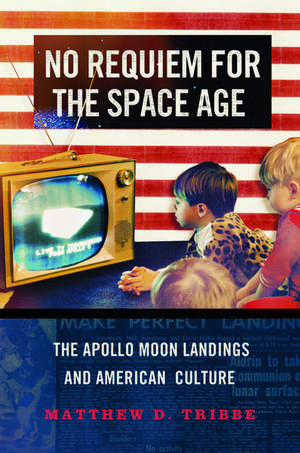No Requiem for the Space Age: The Apollo Moon Landings in American Culture
Autor Matthew D. Tribbeen Limba Engleză Hardback – 17 iul 2014
Preț: 278.85 lei
Preț vechi: 328.35 lei
-15% Nou
Puncte Express: 418
Preț estimativ în valută:
53.36€ • 55.71$ • 44.06£
53.36€ • 55.71$ • 44.06£
Carte tipărită la comandă
Livrare economică 04-10 aprilie
Preluare comenzi: 021 569.72.76
Specificații
ISBN-13: 9780199313525
ISBN-10: 0199313520
Pagini: 290
Ilustrații: 20 hts
Dimensiuni: 236 x 155 x 31 mm
Greutate: 0.5 kg
Editura: Oxford University Press
Colecția OUP USA
Locul publicării:New York, United States
ISBN-10: 0199313520
Pagini: 290
Ilustrații: 20 hts
Dimensiuni: 236 x 155 x 31 mm
Greutate: 0.5 kg
Editura: Oxford University Press
Colecția OUP USA
Locul publicării:New York, United States
Recenzii
A persuasive, rollicking account of the moon landings as the final act in a post-war American love affair with science and rationalism.
Matthew Tribbe's examination of American attitudes towards the Apollo space program in the 1960s is a 'giant leap' away from the platitudes that dominate popular memory and too many historical accounts of the era-a first rate cultural history.
No Requiem for the Space Age is a wonderful read. Tribbe's prose is witty, ironic, and at times refreshingly irreverent. His history is also extremely important. By taking readers on an exploration not only of NASA's Apollo program but also of the films, fiction, and even television advertisements depicting space travel during the 1960s and 1970s, Tribbe traces the gradual decline of American's belief in technological progress and the subsequent rise of a new romantic spirit based on individual experience and subjectivity.
Matthew Tribbe's account of the Apollo program and its demise provides a penetrating glimpse at American values and priorities in the 1960s and the years that followed. The energy of the space effort began to dissipate even before the program ended, and this engaging book shows how doubts about technology and reservations about progress itself dominated the larger conversation.
Matthew Tribbe's examination of American attitudes towards the Apollo space program in the 1960s is a 'giant leap' away from the platitudes that dominate popular memory and too many historical accounts of the era-a first rate cultural history.
No Requiem for the Space Age is a wonderful read. Tribbe's prose is witty, ironic, and at times refreshingly irreverent. His history is also extremely important. By taking readers on an exploration not only of NASA's Apollo program but also of the films, fiction, and even television advertisements depicting space travel during the 1960s and 1970s, Tribbe traces the gradual decline of American's belief in technological progress and the subsequent rise of a new romantic spirit based on individual experience and subjectivity.
Matthew Tribbe's account of the Apollo program and its demise provides a penetrating glimpse at American values and priorities in the 1960s and the years that followed. The energy of the space effort began to dissipate even before the program ended, and this engaging book shows how doubts about technology and reservations about progress itself dominated the larger conversation.
Notă biografică
Matthew D. Tribbe is a Visiting Assistant Professor of History at the University of Connecticut.
















